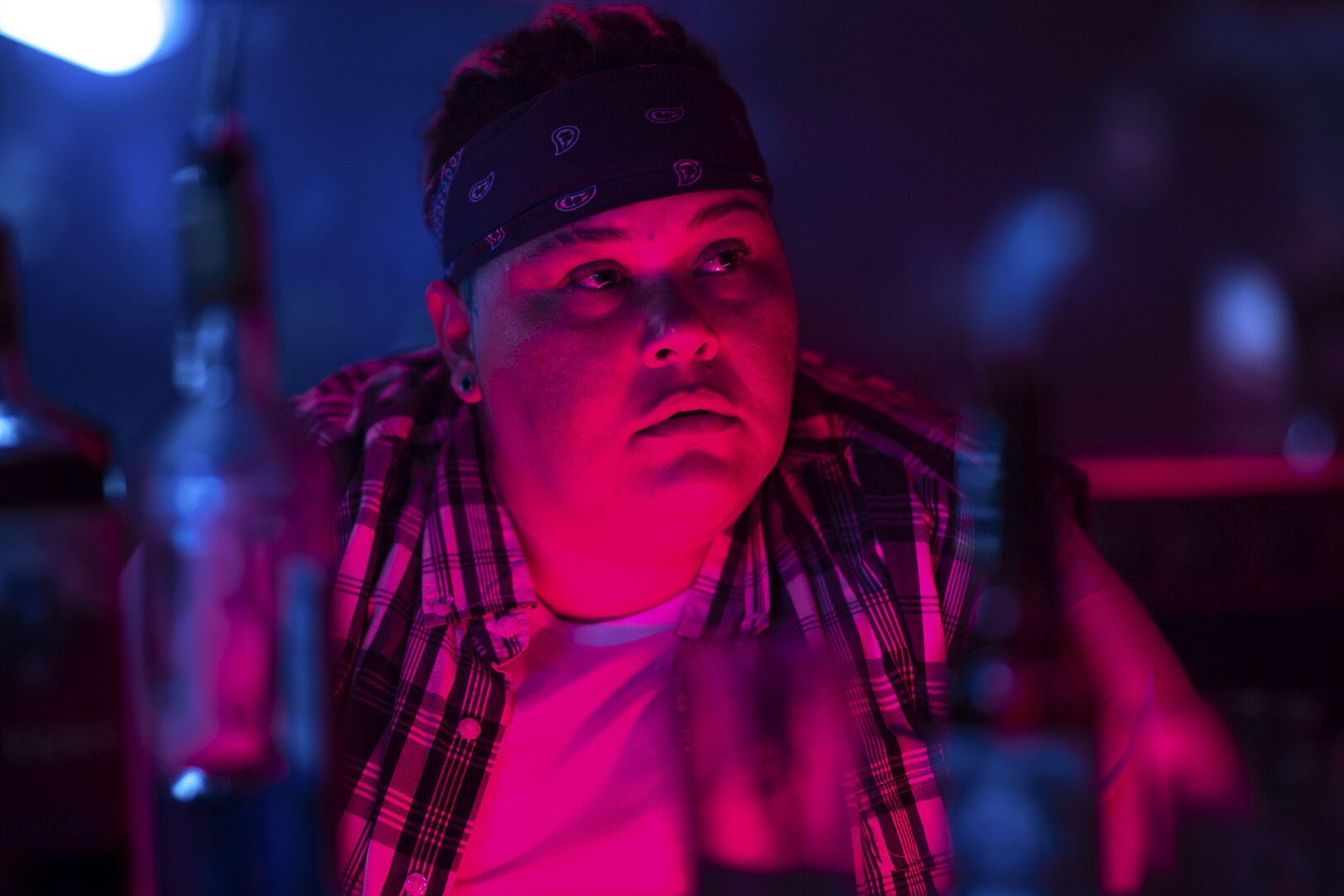NEW FRAME
Protectors, perpetrators and providers in the murder mystery series, Skemerdans

In this murder mystery series directed by Amy Jeptha and Ephraim Gordon, powerful, complex women fight for the legacy of a jazz club in Cape Town’s underworld.
This story was first published on New Frame.
In Skemerdans, characters seek redemption and conspire in front of stained glass windows, behind crystal scotch decanters and in the headlights of cars with CY number plates. The 13-episode neo-noir murder mystery delivers a Cape Town rarely depicted on screen, a shadow world outside the picturesque vistas of the mountain and generationally monied.
Directed by Amy Jephta and Ephraim Gordon, Skemerdans spins on a simple question that expands in complex ways: after the Fortune family’s eldest son, Glenn, is murdered, what will become of his club and its legacy?
Ma Mercia Fortune is the matriarch. Everything is done on her terms: the tea, the silence, the answers. She’s a master negotiator, and a glorious scene of her on a church pew perched between two gangsters displays this in high definition. The formidable character is impeccably brought to life by Vinette Ebrahim.
“My nickname on the set was Mama Mafia,” says the esteemed actress and playwright. “She’s going to bring these boys to church and she will do her negotiating from the pews. She’s going to run the streets, clubs [and] the casinos but she’s going to do it in her quiet, reserved manner, and the boys are going to follow her like puppies. She’s going to play them for the little boys that they actually are.”

Vinette Ebrahim (MERCIA) in Skemerdans. Image: Zaheer Banderker
Women run Skemerdans. Jephta explains: “I wanted to have a world that’s run by women who make difficult choices. It’s okay to have women villains populate your world. From my experience, matriarchal households are the order of the day. The women in my world are by necessity survivors and, yes, sometimes that means that they adopt some patriarchal elements.”
Dropping darkly comedic one-liners, Makes, played by Claire Phillips, exemplifies this. She’s a minor character with an overwhelming presence. In her first scene, the camera slowly pans over her shoes, a baseball bat, a weapon and body. Immediately the audience knows Makes is the muscle, and the muscle is a woman. Phillips masterfully delivers and embodies the casual violence of her character in lines such as, “Ry, naai [Drive, fucker]” or “Lossie man se gevriet. Willie sy looks spoil nie” [Leave the man’s face. Don’t want to spoil his looks]”.
Phillips is effortless, believable and blissful to watch. “Makes was initially supposed to be a male character,” Jephta says, but they cast Phillips instead. She “brought herself to the role, everything from the physicality to the voice to the sense of humour is Claire’s interpretation”. For Jephta, she brings “a different kind of gangster” to the screen. “You just get the sense that Makes sleeps very well at night.”
Sturvy Jessie and kingpin Ma
Played by rising star Trudy van Rooy, Jessie Fortune is another complexly rendered character. She is the boss’ prodigal daughter who loses herself in sex and liquor while always maintaining an external composure. As a “reprieve from all the chaos”, van Rooy says, Jessie escapes into a romantic relationship with a barman, Denver Carelse. “Jessie is selfish because she’s so wounded.”
Carelse tries to get to know Jessie and bring levity to her fraught existence, but she is withholding and responds with opacity. van Rooy says, “To play such an unapologetic character, that’s the dream, a beautiful opportunity to be indulgent … I was on a journey with her every day, because she’s so complex.”
There’s a class dynamic at play in this relationship, with Jessie referred to as “sturvy Jessie”: stuck up, twanging and privileged. Growing up, van Rooy says, she was called sturvy because she spoke English. “When you grow up coloured, you know a whole bunch of coloured people across the class spectrum … Jessie’s exposed to it. She’s heard all the talk, been called all the names, and she doesn’t give a fuck.”
But audiences get glimpses into what simmers beneath Jessie’s stoicism. “That intergenerational trauma, that violence in a middle-class coloured home, I know about that. I don’t think Jessie walks away redeemed,” van Rooy says.

Claire Phillips (MAKES) in Skemerdans. Image: Zaheer Banderker.
Seeking comfort, Jessie turns to her grandmother, Mercia. As unflinching as Ma is, she has endless compassion for her granddaughter. Ebrahim explains that her character “will protect whoever is her blood to the death”. But those who are not family are disposable. Ma Mercia is capable of selling a human being as a commodity and then going to church in the morning.
“She’s actually quite evil if you ask me,” says Ebrahim. “But she knows in her heart dat sy innie hel gan brandt eintlik [she is going to burn in hell eventually].” While Ma is indeed a villain, she does appear to have a real relationship with God, supplemented by old-school wisdom and calm faith. She is a sister of the congregation, dealing with gangsters while quoting scripture.
“Mercia knows that she is a sinner, through and through, but she strives to live the way God would want her to live. She believes that she’s doing the right thing. She does things knowingly,” Ebrahim says.
Her interpretation of her character is that “she would put pebbles under her knees if she could when she kneels down to pray, maar die Here hoor my, môre gaan sy kerk toe and sy verkoop die kerk annie gangsters [but Lord knows, tomorrow she will go to church and sell the church to gangsters]. She’s that kind of woman.”
Cinematography of the familiar
Many episodes are shot with sensuous close-ups of a saxophone or a bassist’s strumming fingers as languid notes and lazy trumpet tones sink into every scene. The show is scored with music those who grew up in these areas will recognise, including numbers such as Montreal by Tony Schilder, Groovy Times by Paul Petersen and Sarah Sarah by Jonathan Butler.
The multitalented Alistair Izobell’s voice immediately grounds Skemerdans in the familiar. He is a Cape Town music legend who has been on radios and stages for decades, with classic hits such as Venus. The child prodigy famously played the role of Broetjie in Taliep Petersen and David Kramer’s District Six The Musical in 1987. In Skemerdans, playing the host Nathan da Silva, he gives an effortless performance.

Skemerdans co-creator Amy Jephta. Image: Gabriella Achadinha
For Izobell, weaving these iconic songs and places into a storyline is significant. “These evergreen songs that were produced by legendary people like Zayn Adam, Pacific Express and Chris Schilder, are so Cape Town, identifiably belonging to a society that has gone through a struggle.”
The celebration of these classics is a testament to the creative vision of Gordon and Amy and Benjamin Jephta, Izobell says. Amy’s brother Benjamin is the composer and bassist responsible for creating Skemerdans’ score. It’s about “marrying the old with the new and then coming up with a concept and a product that is so encapsulating”.
The settings are also storied spaces. Skemerdans is set in iconic places for those who live in the shadow and historical separation from Cape Town’s mountain: Voortrekker Road, the Harlequin Restaurant, Club Galaxy and West End.

Danny Ross (DENVER) in Skemerdans. Image: Zaheer Banderker
“Sweetie, who didn’t go to the Gal?” says Ebrahim about the beloved club. “I’m sure babies were conceived there against the walls of the Galaxy,” she laughs, “if not in the car park. The whole jazz era, everybody went to listen to jazz there on a Sunday, and went to dance and shake what their mama gave them on a Friday night, that was the place.” The club, which is deeply rooted in musicality, is at the heart of the series.
The blurring lights of Voortrekker Road are expertly shot and rendered cinematically in ways that are significant for those who grew up in these parts of Cape Town. For Jephta, this was important.
“That strip is really iconic,” she says. “Driving down that street as a kid I remember falling asleep in the backseat and seeing these lights flash by. It always felt like that road was endless. It was such a comfort at night, in your little bubble of your car, seeing these many lives being lived. I’ve always seen that road through cinematic eyes. I’ve always wanted to make television that frames places I know and make them feel as epic as they actually are. We have a tendency to look down sometimes on the places we are from as not interesting enough.”
Class and representation
Skemerdans lives in the space between decent and shady, between those who build for years and those who take shortcuts. Throughout the series, we witness the descent of decent characters who are pulled down into lower “levels van bestaan [levels of existence]”, as a monologue between brothers in different situations makes clear. Class gaps play into these levels, as bread-and-butter issues stand in contrast to the lush club-owning life.
“They’re worried about issues of legacy,” Jephta explains. “We never see our people struggling with those kinds of questions on screen. We always see people struggling with issues of how [are] we going to pay the rent?
“It was important for us to show there are juxtapositions and not everyone in that community is having the same kinds of thoughts and struggles. To be like, here’s the kind of life you expect people of colour to be leading and here’s the other kind of life that’s also possible.”

Ceagan Arendse (WARREN) in Skemerdans. Image: Zaheer Banderker
“I really believe that there’s going to be a second season,” says Ebrahim. “My heart breaks when I think that Ceagan [Arendse] is not around to do it.” The actor who played Warren, the black sheep of the family, died in February 2021. Izobell says, “He made such an impact in my life and I celebrate those moments that I got to share with him.”
Skemerdans’ strength is in its deliberate and skilful storytelling, delivering a cinematic representation of Cape Town rooted in the slick, shadowy spaces of the city. It is unafraid to delve into messy terrains, particularly in its representation of characters, class and capitalist consumption.
“I know we were handpicked by Amy and Ephraim – and what a match,” Ebrahim says. Both she and Izobell applaud the directors on the way they have written Skemerdans. With Makes as the muscle, Jessie as her justice and Ma Mercia as the ultimate puppet master, Cape Town’s nightlife is run by women, and God help those who stand in their way. DM/ML
Skermedans is available on Showmax.

















 Become an Insider
Become an Insider
Comments - Please login in order to comment.